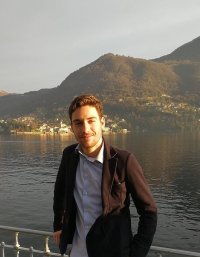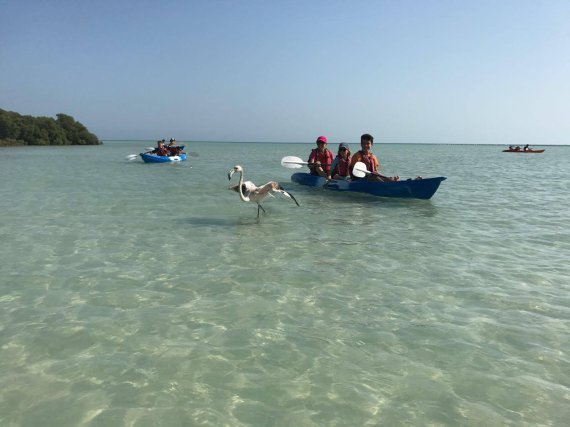Doha feels like Dubai as it was 10 years ago. Because Qatar is hosting the World Cup in 2022, the Qatari are constructing building after building and modernizing their infrastructure at incredible speed. Everywhere I walk I see construction sites. In the few weeks that I’ve been here, I can already notice differences in the city plan.
In the middle of the desert
Qatar is trying to find sustainable alternatives to its current fossil fuel industry, as it wants to become less dependent on oil. That is why I am currently doing research for Qatar University on growing native microalgae. The site where we grow them is in the middle of the desert. It’s a surreal feeling when you can see nothing but sand, sky and the sun, and then suddenly a few white buildings appear in the desolate landscape. I had this type of mirage feeling again on a kayaking excursion to the north of the country. We had been driving across the desert for miles and miles when suddenly we saw a purple-looking island in the middle of the dunes. It was a beautiful place with shallow water covered by very low mangroves and with flocks of flamingos all around it. Kayaking in this desert paradise is definitely one of my highlights so far.
Low-intensity work days make sense if you know locals don’t need to work for a living

Lazy workdays
The wealth of the country due to its oil and gas reserves is clearly visible not only in the magnificent buildings and big cars, but also in the work culture. My workdays have been quite lazy so far. I wake up at 8:30, work till 14:30/15:30 and at that time everyone is already leaving the lab. These low-intensity work days make sense if you know locals don’t need to work for a living. Qatar natives receive a living allowance from the moment they are born and are even gifted a house by the government.
Extravagance and semi-salvery
Qatar is truly a land of contradictions. The country follows Islamic law and alcohol is difficult to buy, but it is very liberal at the same time. Most of the university staff and students are female for example. There is another contradiction surrounding the boycott of Qatar by other Arab countries. It was meant to damage Qatar economically and socially, but actually it made the country stronger and more independent. I’ve noticed extravagance rather than shortages. The South-East Asian migrant workers working in semi-slavery conditions are a stark contrast to that wealth, however. You encounter them everywhere in the city, working full days outdoors in the hot sun for very low pay. Unfortunately, I haven’t been able to talk with locals about this issue. I’m mostly surrounded by expats (only 12 per cent of the Qatar population is local), and it is also seen as a bit of a taboo subject. Colleagues have told me that things are changing. The approaching World Cup has prompted a lot of criticism of the harsh labour conditions, and now the government is trying to bring in legislation to improve these workers’ situation step by

